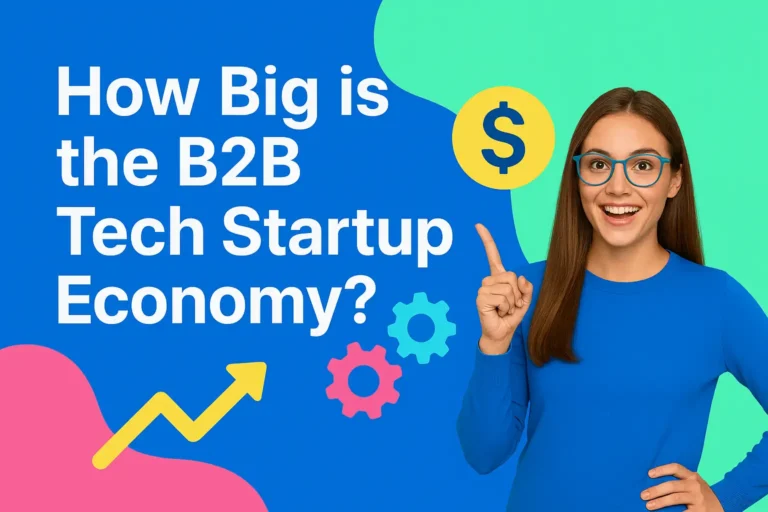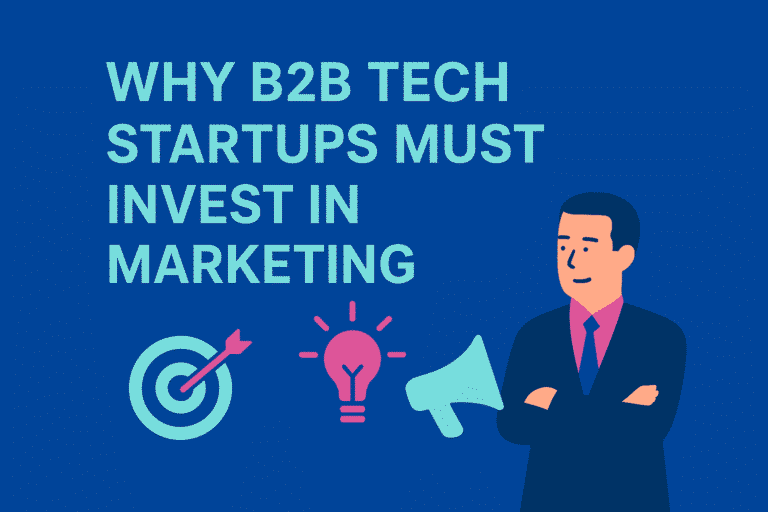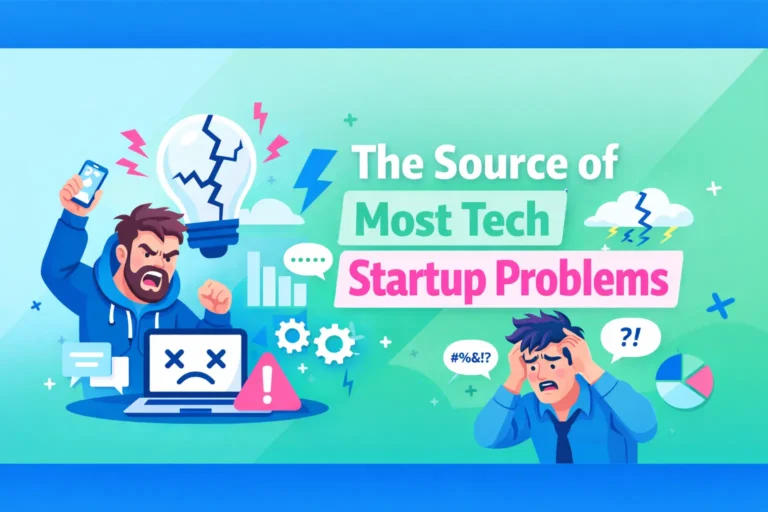What is the Dunning-Kruger Effect?…
The Dunning–Kruger effect is a cognitive bias where people with low ability or knowledge in a particular area overestimate their competence, while those who are more competent may underestimate their ability. In short, the less you know, the more confident you are, and the more you know, the more aware you are of what you don’t know. It was identified in 1999 by psychologists David Dunning and Justin Kruger, and it helps explain why unskilled people often don’t realise their lack of skill because recognising one’s incompetence requires the very expertise they lack.

How Cognitive Bias Can Stop Startup Growth
Running a B2B tech startup is a high stakes endeavour for everyone involved, but success is often thought to hinge on innovation, speed and scalability. Founders build cutting-edge products, hire brilliant engineers and secure impressive seed funding, but often fail to gain traction in the market. Why? One powerful but often overlooked factor is the Dunning–Kruger effect. This bias can subtly but significantly distort what a founder thinks about their business. This will inevitably impact decision-making, stifle growth and ultimately prevent a promising company from reaching its full potential.
Only Hearing What You Want to Hear
Founders, especially those from technical backgrounds, often fall victim to a classic Dunning–Kruger dynamic because they overestimate their understanding of customer needs, sales strategy and market messaging. This is understandable to a point, as a talented engineer who builds a sophisticated AI platform might assume that the value of the product speaks for itself. When it comes time to bring it to market, that same founder may ignore or dismiss feedback from sales teams, marketing leads, or worse, actual customers, because it doesn’t fit their internal narrative.
For example, a tech founder may believe that their product’s advanced technical features are its main selling points. They create decks full of jargon, focusing on algorithmic superiority rather than business outcomes. When marketing tries to shift the messaging to “pain point” language that resonates with decision-makers, it’s brushed off as dumbing down the product. The result? A disconnect with buyers, poor conversion rates and friction across departments.
Marketing is the Most Undervalued Department
Nowhere is the Dunning–Kruger effect more prevalent, and more damaging, than in early-stage startup marketing. In many B2B tech startups, especially those led by engineering-first founders, marketing is seen as a cost centre, not a growth engine. It’s often handed off to a junior hire or a freelancer without a real seat at the strategic table. Why? Because the founder believes they already understand the market and think marketing is just about making a few LinkedIn posts, launching a website or running some digital ads. This creates a situation where marketing is underfunded, under-led and underpowered, leading to vague positioning, inconsistent messaging and campaigns that don’t scale.
A Real-World Example
A SaaS startup offering cybersecurity tools for SMEs that ran high-cost PPC campaigns focused on technical features, quoting “AES-256 encryption” and “multi-factor authentication.” Responses were low and bounce rates were high. When a marketing consultant recommended a shift to problem-based messaging, such as “Stop ransomware before it starts” and “Protect your business without hiring an IT team,” the founders rejected the idea, believing it wasn’t serious enough. Sales remained stagnant, while competitors using simpler, value-focused messaging grew rapidly.
Sales Teams are Misunderstood and Mistrusted
Sales is another key area where Dunning–Kruger bias creeps in. Tech founders often hire their first sales rep too late, and when they do, they either micromanage the process or expect instant results, without providing the right tools, messaging or strategy. More damaging still is when founders ignore feedback from the sales frontline, especially if it contradicts their assumptions.
For instance, a salesperson might report that prospects are confused by the pricing model or see no clear ROI, but if the founder views themselves as the expert in what the customer wants, they may disregard this, believing the issue lies in the rep’s execution rather than the offer itself. Founders apportioning blame to sales for a lack of new business is often nothing more than deflecting the issue away from themselves, usually because they can’t see that the real problem lies with their own cognitive shortcomings.
A Real-World Example
A startup building IoT infrastructure tools for logistics companies insisted its pricing model, based on API calls, was more scalable. Reps reported that every prospect balked at the unpredictability of the cost, asking for flat rates or usage tiers. The founders refused to adapt, assuming the market would get it eventually. Their closest competitor, which launched six months later with simple tiered pricing and customer-friendly onboarding, rapidly overtook them in revenue.
The Feedback Filter Problem
The Dunning–Kruger effect is concerningly dangerous because it influences not only how decisions are made, but also what feedback is heard. Startups often pride themselves on agility, but cognitive bias creates a filter where only confirming evidence is accepted. Marketing says lead quality is low, so we blame the ads. Sales says the value proposition is unclear, so we blame the rep. Customers say onboarding is confusing, so they’re just not the right fit… and so on. A tech founder’s own echo chamber can be very dangerous because in these moments, they only hear what they want to hear, not what they need to hear. This gets quickly copied by their teams and can become part of the culture, so now we have a company-wide issue. This can make continuous improvement, which is a hallmark of successful startups, almost impossible.
How Founders Overcome the Dunning-Kruger Effect
First and foremost, tech founders must hire experts and listen to them, without assuming their technical skills automatically translate to marketing or sales. You must respect the professionals you bring in and give them space to do their job. Making educated assumptions can often be necessary when information and data are limited and a decision must be made. However, at some point, everything must be validated, using real customer interviews, campaign testing and data analytics to challenge your thinking, especially about messaging, pricing and buyer priorities.
Feedback Loops and Constructive Debate
Feedback loops from all departments are important, but none more so than when executing and refining a go-to-market strategy. Marketing, sales, product and customer success must all be in constant communication, not silos. It’s important to encourage a mild dissent and reward ‘constructive’ disagreement. By training for humility, you can build a culture that values learning over ego, where everyone works together to create the best outcomes for the business, regardless of where an idea comes from. The most dangerous founder isn’t the one who doesn’t know, it’s the one who doesn’t know they don’t know.
Don’t Let Your Startup Become a Nostalgic Memory
The Dunning–Kruger effect isn’t about being stupid; it’s about being human. In the harsh environment of B2B tech startups, especially when they experience early success, they can often demonstrate overconfidence, bordering on arrogance, and founder ego exacerbates the problem. Unchecked, this fast becomes a negative factor, especially in marketing and sales strategy, which is often the difference between scaling and stalling. Smart founders don’t try to be experts in everything; they surround themselves with people who know what they don’t know, and then they listen to them. The startups that do that are the ones still standing when everyone else fades into LinkedIn nostalgia.
You may want to read: “Why B2B Tech Startups Must Invest in Marketing.”







